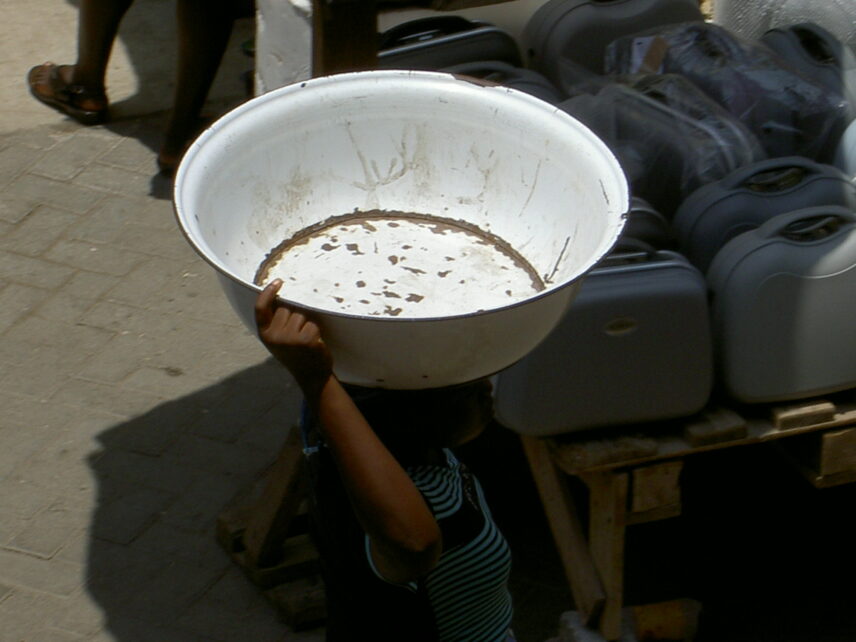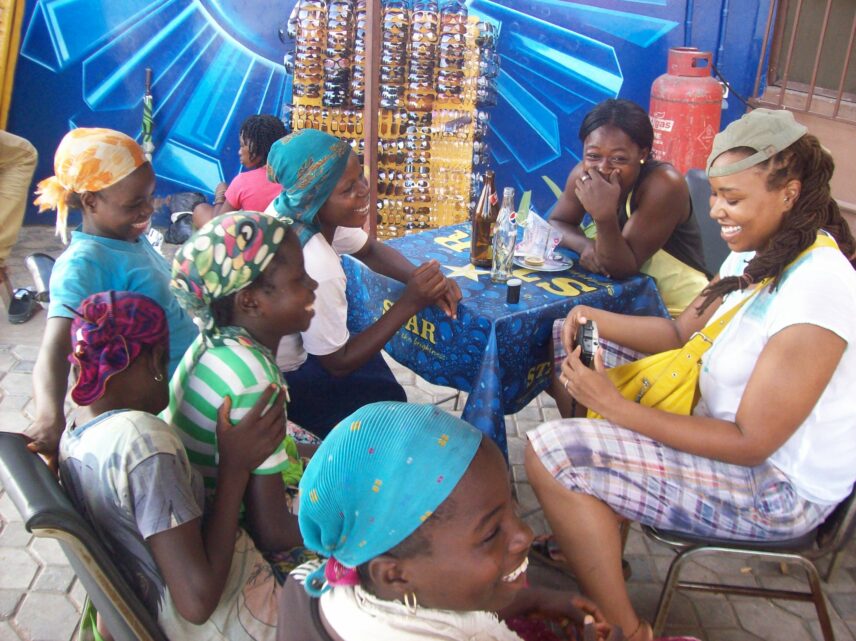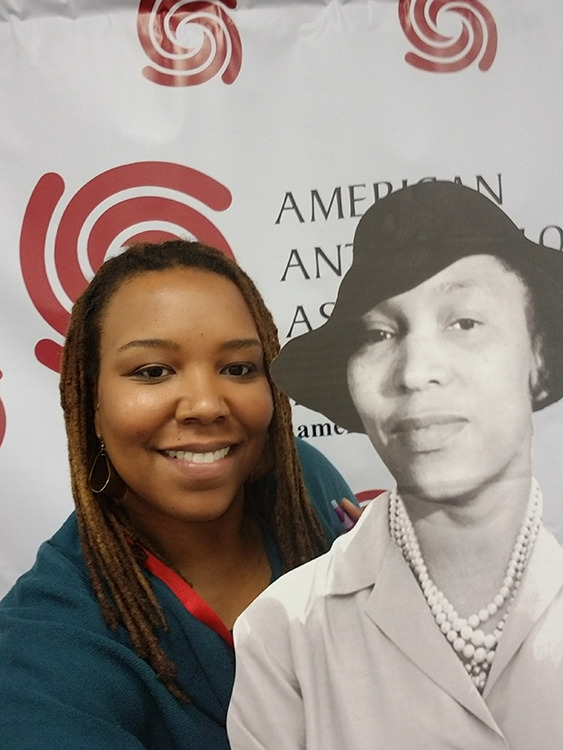Article begins
I am elated to be president-elect of the Association for Africanist Anthropology (AfAA). It is both an honor and a culmination of chances in my academic journey. As the incoming president of AfAA, I’d like to share a bit about my road to anthropology and outline some of my goals and aspirations for AfAA.
I came to anthropology, quite accidentally, and a graduate student. As an undergraduate, I studied African and African American studies and journalism. At Penn State, my sole encounter with anthropology was a pessimistic introductory course taught by a weary instructor. I did not think about anthropology again until a London vacation the summer before the start of my first job as a journalist. While searching for the entrance to the British Museum in central London, I wandered into a graduate program open house at SOAS, University of London. The lined table displays led to the Brunei Gallery where I chatted with anthropology faculty. While there, I collected some marketing fliers and admired the striking photo ethnographies by graduate students that were on display. The hour-long experience was a pleasant detour in my urban tour and the encounter helped reframe the lackluster takeaway I had about anthropology from that single undergraduate course.
When I returned to the United States, I began my (short) career as a journalist. Happy with my assignment to the Life & Style section of a Philadelphia-area newspaper, my soft-news beat included a weekly spotlight of a local hero, as well as coverage of fashion, art, and design events. Each week, I had the unfortunate experience of watching my articles undergo significant cuts at the copy desk. I wanted readers to know the backstory for the glitzy events and the designers who styled the generous donors. The copyeditor opined that my local hero stories were too long. I wanted neighbors to glimpse the spark that ignited the local heroes’ passions. The managing editor chided the details of my interviews. In less than a year, the broadsheet of newspapers felt too narrow for the kinds of stories I longed to share, and I doubted my future as a journalist.
I also missed traveling.

As I reflect on my earlier study abroad experience in Ghana, as well as my London vacation, overseas graduate study felt like a solid way to blend my travel interests and my fascination with stories. I decided to apply to graduate school. With the acceptance into the MA program in anthropology of media at SOAS, my relationship with anthropology took root. At the student union, I marveled when classmates smoked joints while debating social anthropology theory with Africanists Richard Fardon and JDY Peel. Stuart Hall held Friday salons at the nearby University College of London. My roommates and I stood in a queue that snaked down a long street to hear Edward Said give a keynote lecture. As a working-class Black woman, and first-generation student, these exhilarating experiences were not without the haunts of imposter syndrome that chip at joy and confidence. Still, nerdiness was stylish at SOAS, and soon after I completed the MA, I returned home to pursue my PhD in anthropology at Temple University.
I am a cultural and visual anthropologist with a deep commitment to Black feminist methods, sensory ethnography, and stories about women’s mobility, migration, and social immobility in Ghana and the African Diaspora. I am especially interested in the haptic nature of photography and the way affective registers of gender, race, and modernity materialize through storytelling. Over the years, I’ve learned this assortment of interdisciplinary interests faces strong intellectual headwinds, including the persistent marginalization of Black scholars in anthropology and African studies and the North Atlantic hegemony in discourses on modernity and Black feminism (Allman 2019; Katshunga 2019; Mafeje 1997). Still, anthropology, and its output, ethnography, is a field of storytelling that creates space to situate African women’s lives beyond the supplemental appendix of policy recommendations or as intervals on quantitative data sets.
South African anthropologist Rosabelle Boswell contends that ethnographic narratives tend to pay closer attention to social context rather than their embodied affect and sensory politics. Broadening Audre Lorde’s “the personal is political” to add that the perceptual is also political, Boswell proposes sense-work as an approach to listening and writing that links social orders of gender, race, and class to “visual, gustatory, aural, and olfactory aspects” of bodily experiences and power (196–7). In my work with Ghanaian rural migrants who come to Accra to work as head porters in the market, sense-work focuses on African women’s lives as a space of theory-making. The hierarchies of market labor uphold the market as an essential sphere of women’s labor while also fueling erasures of certain women as undesirable.

The socioeconomic exclusion porters confront has little to do with how hard they work or the places they live, but rather how their marginalization is tied to processes that predate their migration to the city. Photovoice and other visual methods have proved useful to show, as well as tell, how body politics are personally and anthropologically revelatory. But if we don’t know their names, or the frameworks they use to position their experiences, when women push back or disappear, anthropologists will not have the skills to name harm as trauma or to understand joy as liberatory. The point of stories is not to diminish or overlook the weights of poverty that impinge on African women’s lives, but to bring their daily worlds into fuller view to amplify how women live within the crosshairs of burdensome work while also constructing vibrant intimacies in the ordinary of everyday life.
I was excited to attend my first AAA Annual Meeting in 2005. I was a second-year PhD student as well as organizer and presenter on a Saturday afternoon double panel. I was also petrified by the scale of the Annual Meeting and anxious about my first national conference presentation. In the end, the panel was well-attended, and the discussants were both generous and generative in their critiques. But then, and now, it is in the sections of AAA, like AfAA, where a sense of community deepens. AfAA is a small and lively section, and instrumental for Africanist scholars who do not have a robust cohort of colleagues at their home institutions. At AfAA, there are like-minded folks who have a dual passion and commitment to equity in Africa and anthropology. At the business meetings members build relationships around their multidisciplinary interests, enjoy the Distinguished Lecture, and fellowship with one another at the annual reception. At the AAA Annual Meeting, the section also presents three awards. These are the Elliot P. Skinner Book Award, The Bennetta Jules-Rosette Graduate Essay Award, and the Nancy “Penny” Schwartz Undergraduate Student Essay Award. Africanist scholars are acutely aware of the pernicious characterizations of Africa, as well as the substantive work anthropologists have done and continue to do, to disrupt the homogenizing narrative of a continent in constant peril. AfAA continues to be crucial to this effort. Each of these awards exists as part of the broader effort of AfAA to encourage Africanist anthropology at every academic level.

As stated in the mission, the purpose of the Association for African Anthropology is to “stimulate, strengthen, and advance anthropology by promoting the study of Africa, as well as Africanist scholarship and the professional interests of Africanist anthropologists in the United States, and both in and outside of the African continent.” I am thrilled to be the president-elect of AfAA with the opportunity to follow my predecessor Yolanda Covington-Ward. The ethics of accountability in leadership best show up best in commitments to inclusive growth and equitable access. I appreciate Yolanda Covington-Ward’s skillful leadership and important strides in the areas of outreach, mentoring, and public advocacy. As a leader in AfAA, my priorities will focus on three areas: bolstering the section’s social media presence and amplify the scholarly work and research accomplishments of our members; increasing the membership of Africanist anthropologists in AfAA, especially among scholars of color and minoritized scholars; and increasing our mentor network and providing greater intellectual resources to graduate students and early career scholars, especially those in academic departments outside of anthropology. In addition, I look forward to working for AfAA, welcoming new members, and continuing the rich diversity of intellectual labor that emanates from our organization. Please join us!

